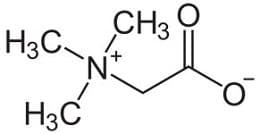Betaine anhydrous. What’s the deal? As of lately, this little known compound has managed to get itself into nearly every serious muscle building supplement there is; all the while keeping a pretty low profile.
How did this happen?
Well, while betaine has managed to stay out of the public spotlight – it’s been under the microscope for quite some time. This research has led us to believe that there are some pretty significant reasons to add betaine, or supplements including betaine into your routine.
Based on clinical trials, we now believe that Betaine:
- Is an effective muscle builder
- Increases muscle hydration
- Supports overall health
And these aren’t based only on animal studies (granted there are more animal studies than human). We took a look at several walking, talking, real human betaine pill-popping clinical trials supporting the hypothesized need for betaine in the gym.
Below, we’re going to cover brief overviews of these studies to supply you with the most current information on betaine supplementation for bodybuilding.
What is betaine anhydrous?
Betaine is a pretty simple molecule found most abundantly in spinach, wheat germ, and its name founding vegetable: beets.

As you can see, betaine is simply a glycine molecule with three methylation promoting methyl groups attached. In the body, betaine is commonly produced from the degradation of choline in addition to dietary sources.
Once available in the body, betaine does one of two noteworthy things with its methylation capability. This is either by facilitating homocysteine into glutathione, or stimulating an increase in bodily SAMe levels.
Both of these molecules increased by betaine have considerable benefits on the human body.
In addition to methylation action, betaine is also what is known as an osmolyte. Meaning, betaine has an affinity for water, and therefore, can increase the hydration and maintenance of hydration in cells.
This osmolyte effect is hypothesized to be the primary muscle growth promoting benefit behind betaine supplementation.
Human Studies Promoting Betaine Supplementation
In 2010, a UC study utilizing 12 regularly training men found that the group supplementing with 1.25 grams betaine 2x daily increased power, force, and maintenance in upper body exercises. Unfortunately, beneficial results were not found in leg exercises over the 14 day experiment. You can view this study here.
Later in 2012, the UC evaluated the effects of betaine supplementation on circulating levels of GH, IGF-1, and cortisol in 12 men over 2 weeks. At the end of the study, it was determined that betaine supplementation increased both GH and IGF-1 while reducing cortisol. Note – this study was funded by DuPont, whom makes a patented betaine supplement. View this study here.
A study published in the journal of strength and conditioning (2011) evaluated the effects of betaine supplementation of weight training. This study concluded that betaine supplementation increased reps and training volume in men when taken at 2.5 grams per day. View here.
A 2009 study published in JISSN found betaine supplementation to increase the number of squat reps and improve peak power. This interestingly compares to the 2010 Connecticut study which didn’t find leg gains. View here.
Decently impressive, right?
There is still a lot of research to be conducted involving betaine and muscle growth in humans. But, this is a good start and it’s looking pretty hopeful.
From what we can see through direct human studies, betaine increases muscular endurance which translates into more reps and better performed repetitions. Naturally, this performance increase will most likely translate into improved muscle growth.
The mechanism in which betaine works in the body is still pretty unclear. However, it has been tested in comparison to creatine since both supplements produce somewhat similar results. So far, researchers believe that these two mechanisms are completely different, and, can work synergistically together much like HMB and creatine.
Final thoughts on betaine: what we think
Betaine is still new and absolute rock solid research doesn’t exist yet. But, we’ve seen some pretty good results on a personal gym level. Taking things further and combining Betaine with supplements such as HMB and creatine is a thought-inspiring concept for improving physical performance and maximizing muscle growth.
